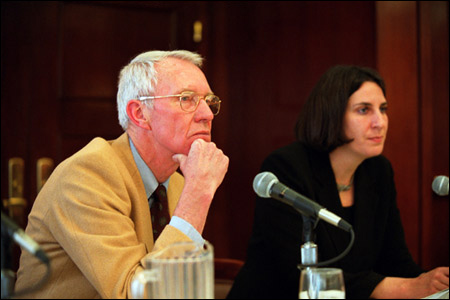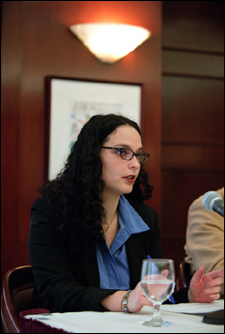Iran: Nuclear headache is just beginning:
Experts say Iran must be dealt wtih pragmatically, not ideologically

Revelations about Iran’s nuclear power program have added to the Bush administration’s foreign policy headaches, but Harvard experts said Wednesday (March 12) that the solution lies in pragmatic, not ideological, dealings with Iran.
Recent revelations that Iran’s nuclear program was far more advanced than previously thought immediately raised suspicions of a hidden nuclear weapons agenda. Those suspicions come at a time when the administration is already juggling foreign policy crises in Iraq, North Korea, and Afghanistan, and is also chasing terrorists around the globe.
But authorities at Harvard’s Kennedy School of Government said there’s a crucial difference between the Iranian situation and those of North Korea and Iraq, both of which had been caught trying to develop nuclear weapons.
Evidence hasn’t yet surfaced that Iran’s nuclear program is not intended to generate electric power, as Iranian officials insist. Though some are skeptical that the program won’t be used to create weapons, so far no evidence has been found to contradict Iranian officials.
Brenda Shaffer, research director of the Belfer Center for Science and International Affairs’ Caspian Studies Program, counseled American officials to deal with Iran pragmatically. She said U.S. leaders and the public take Iranian revolutionary rhetoric too seriously and said that we ought to judge Iran by its actions. Iran has repeatedly acted according to its secular national interests – supporting the Russian government against Muslim Chechen rebels, for example – rather than following some ideological guideline.

“To succeed, we have to see Iran as a practical, pragmatic bargainer,” Shaffer said.
Shaffer spoke at a panel discussion, “The Forgotten Threat? Iran and Weapons of Mass Destruction,” sponsored by the Belfer Center’s Caspian Studies Program. Shaffer was joined in the discussion by Chen Zak, a fellow with the Belfer Center’s International Security Program, and Steven Miller, director of the Center’s International Security Program. The discussion was moderated by Lt. Gen. Tad Oelstrom, director of National Security Programs and adjunct lecturer at the Kennedy School.
Shaffer said Iran’s apparent anti-Americanism is a short-term phenomenon, a tool used by the government to maintain its popularity and its grip on power. The vast majority of Iranians, she said, favor good relations with the West and embrace technological advancement and development.
In order to solve the problem, however, we have to understand Iran’s situation, panelists said. The nation is in the middle of a very unstable region, with Iraq on one border and nuclear-armed Russia, China, India, and Pakistan nearby. With war looming in Iraq, the Iranians are also facing the prospect of a postwar Iraq full of American troops within easy striking distance.
Iran also sees itself isolated internationally, Zak said. When Iraq attacked with chemical weapons during the Iran-Iraq War, the international community took no strong stance. With so many potential aggressors in nearby countries, and little prospect of strong international allies to help, Iran may feel it has no choice but to develop weapons of mass destruction.
The United States can also look to Russia for help with Iran more than we have, according to Shaffer. U.S. officials should also understand that Iran is a lot more important to its neighbor, Russia, than it is to us, and treat it in negotiations with Russia as an important strategic issue – to them as well as to us.
“We need to understand that Russia-Iran is of the highest strategic priority to Russia and they’re going to have to get something of highest strategic order [from the United States],” Schaffer said.
She said it may take something as critical as making Russia a partner in the development of missile defense systems, or changing NATO to let Russia enter as a full member.
Miller said the Iran situation is the latest in what he termed “a series of slow-motion challenges to the nonproliferation treaty.” The problem, he said, is that the technology used to make materials that can be used in nuclear weapons is very similar to that used for domestic energy programs.
There’s nothing in the treaty to prevent a nation from obtaining the material and technology to build nuclear reactors for energy generation. They then can pull out of the treaty after the infrastructure has been established, when they’re just months away from developing a weapon.
“If you seek self-sufficiency in nuclear power, you’re buying equipment that has nuclear weapons capabilities,” Miller said. “You can build a weapons infrastructure while calling it a civilian program…. That’s the kind of challenge the Iran case provides.”
Miller said given the international dissent on how to handle Iraq and North Korea, both of which have been caught trying to develop nuclear weapons, he expected the international community will do little about Iran in the near future.
“The world has found very little agreement about what to do in cases of clearcut cheating [on the nonproliferation treaty], so it’s unlikely it’ll go into lockstep on Iran,” Miller said.
Miller said the Iran situation could be another test case for the “Bush policy of dissuasion,” where President Bush has tried to leave little doubt about the U.S.’ willingness to use force to prevent nations from developing weapons of mass destruction. The problem with the policy so far, Miller said, at least in North Korea, is that it appears to have had the opposite effect.
“In the North Korean case, they’ve stomped on the accelerator instead of the brake,” Miller said. “They seem to say they feel they ought to have weapons of mass destruction before the U.S. gets [involved].”




